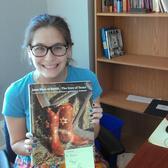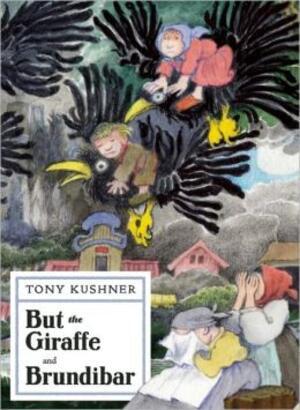But the Giraffe
Last weekend, I was fortunate enough to catch the final performance of Underground Railway Theater’s Brundibar & But the Giraffe, which was actually two plays separated by an intermission. The first of which, But the Giraffe, by multiple-award-winning playwright Tony Kushner, is about a little girl given a choice; her family is frantically packing up their belongings, and there is very little room left in their suitcase, and she must choose between bringing her beloved toy giraffe or the score of an opera for children, Brundibar.
It becomes apparent over the course of the play that we are watching a Jewish family in World War II-era Prague prepare for life in a concentration camp. As the story unfolded, and the little girl’s struggle to choose her companion or the score that her uncle reminds her could make many people happy, becomes more frantic, I too felt the frenzy of her family’s packing. It suddenly made my agitation before every vacation seem completely insignificant. While I’m deciding whether to pack the blue dress or the black dress, this family must decide whether to make one little girl happy or dozens of children happy. The choice of the giraffe or the score is a history-changing one, and I felt the burden of it even if the little girl never fully understands it.
But the Giraffe ends, and Brundibar begins. Act Two of this production was the very musical score the little girl chose to save in sacrifice of her friend the giraffe. The characters of her parents accompany the children on instruments and eventually become characters in the opera, her uncle conducts, and even her grandparents join the cast. The story of Brundibar is pretty simple: the mother of two children is dying, the doctor says she needs milk, and the children decide to try singing for some spare change from the townspeople. The town organ grinder, Brundibar, thwarts them in their attempt to entertain and earn money. That night, the children are visited by a cat, a dog, and a sparrow, who promise to help them gather up the children of the town to put a stop to Brundibar’s greedy ways and awful music-making. The next morning, they put their plan to action and throw Brundibar out of town. It’s a triumphant and joyous ending—until alarms goes off and the theatre blackens to nothing but search lights. And suddenly the audience is thrust out of the world of Brundibar and back to Terezin, the concentration camp where Brundibar was performed over fifty times by the Jewish community of the camp. As the alarms sounded and the lights dimmed, it dawned on me that this wasn’t just a lovely opera written for children. This was history. Seventy years ago, Brundibar was performed in front of SS soldiers and Jewish prisoners and used to make the concentration camp look like a holiday getaway, rather than the purgatory it truly was.
Sophie Rich, one of the production’s Youth Ensemble Support Associates (I like to describe her as the “child wrangler”), happens to be my roommate and one of my best friends. When I asked her about her feelings on the play, she responded, “As a theatre artist, I constantly ask myself the question, ‘Why now?’ I feel so lucky to have been a part of Brundibar because I got to witness thirty courageous child actors devote themselves to telling a story that truly needs to be told, and told now. We live in a time and place where we are constantly confronted by the evil that is happening in our world. On the one hand, Brundibar throws its audience into the middle of the greatest evil in human history. On the other hand, it is a reminder of the power of friendship, spirit, optimism, and teamwork in the face of strife. Just as the children in Terezin used Brundibar as an escape from the horrors of their daily life, and just as the characters in Brundibar end the show with a reminder that ‘our friends make us strong,’ so did the children I worked with show me that there is a young generation itching to use their voices to effect change. From ages 8-18, they were fearless enough to recreate and honor the children who died shortly after performing this opera, to imagine and act out the pain of life in Terezin, and to create a vibrant ensemble whose real life friendships made the message of the story resonate even more deeply.”
Anyone who knows me well knows that I am very open about my emotions, and therefore have absolutely no problem with openly weeping during live performances. But my tears at the end of Brundibar were no ordinary tears. The play itself isn’t overly upsetting or overly joyous; rather it was the realization that I was witnessing a recreation of history that moved me to tears. Brundibar is a recreation of a time and a place where hope was feigned, where putting on a show wasn’t for profit or even just for fun. Brundibar was performed at Terezin to give people, specifically children, a little bit of their lives back. I cried as the show ended because I am so grateful to be able to go to the theatre, to walk home without fear, and to return to my comfortable apartment. But most of all, it made me grateful for and reaffirmed my chosen purpose in life: to keep history alive. To make sure that stories are being told. To be absolutely certain we never forget what happened to the victims of Hitler’s Holocaust and to the victims of genocides and mass murders and persecutions that are still happening today. If it’s not clear why I’m writing about this for the Jewish Women’s Archive, let me make myself perfectly clear: I wanted to work at JWA because, as our logo says, we are sharing stories and inspiring change. Brundibar & But the Giraffe are not just stories. They are stories that must be told to remind us of what happened, what is still happening, and inspire us to jump up and say, “Well what am I going to do about it?” So, tell us: what do you think we are going to do about it?








So brilliant. Eloquently written, and thoughtfully crafted. I love Kushner and I wish I would have been able to see or be a part of this production!
In reply to <p>So brilliant. Eloquently by gpbhudkins
Thank you so much, Grace! I hoped you would read and enjoy this post, I remember your love of Kushner. That combined with children and theatre, this production had you all over it! :)